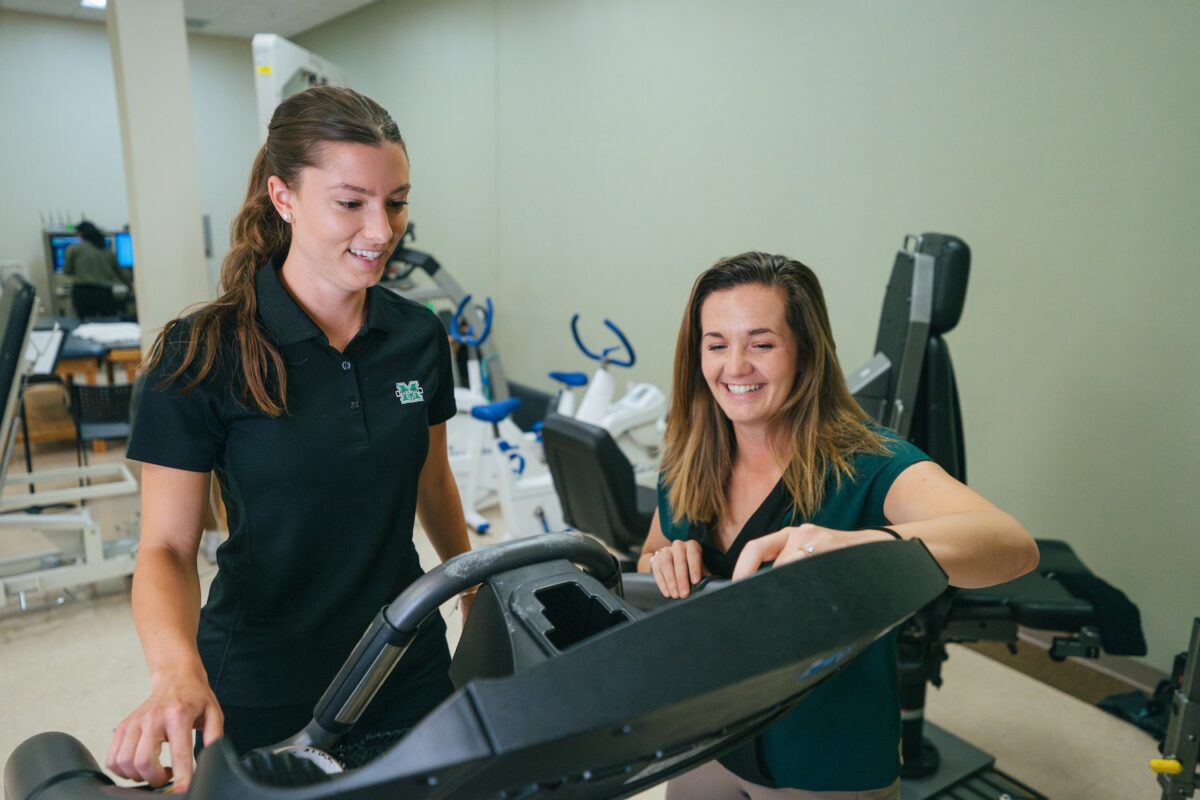As the fall semester at Marshall University and other institutions come to a close and…
Navigating Your First Semester: A Guide to Success

As a native West Virginian and someone who has witnessed the transformative power of education, I’ve had the privilege of guiding students through their academic journeys. I view education as the great equalizer. It levels the playing field of opportunity, transforms problems into possibilities, and turns dreams into reality.
Your college experience will offer countless opportunities to learn, grow, and build lifelong relationships. As you embark on this exciting new chapter, I wanted to share a few things I’ve observed along the way to help you start your first semester off on the right foot and make the experience even better.
1. Get Involved Early

One of the best ways to start your first semester strong is to get involved in campus life. Whether it’s joining a student organization or club, attending campus events, or participating in community service, getting involved helps you build connections and feel more at home. Most universities have a wide range of student organizations that cater to various interests—whether academic, cultural, social, or professional.
Actionable tip:
Join student organizations that align with your interests or career goals. Many universities offer resources like student incubators or innovation centers, similar to Marshall’s MUiCenter Student Incubator, where you can apply what you’re learning in the classroom to real-world situations and collaborate with like-minded students who share the same interests. Joining these groups can help you find your niche on campus.
2. Take Advantage of Campus Resources

As you begin your first semester, take full advantage of the resources available on campus, such as tutoring centers, writing labs, and academic advising. If you’re struggling with a particular subject, don’t hesitate to visit your university’s tutoring center. Academic advisors can also help you plan your course load and ensure you’re on track for graduation.
Actionable tip:
Take time to familiarize yourself with these resources early in your first semester. Many universities also offer learning communities or experiences tailored to students. For example, at Marshall, we have an entire compilation of activities and opportunities specifically designed for students in their first year. These programs can help you connect with peers and faculty while easing the transition into college-level coursework.
3. Manage Your Time & Cultivate Resilience

Resilience, or grit, is about combining passion and perseverance in the pursuit of your goals. College can be challenging, but it’s these very challenges that help you grow stronger. Time management will be crucial for balancing academics, social activities, and personal time. Learning how to manage your time effectively will set the tone for your entire college career and what comes after.
Actionable tip:
Use a planner or digital calendar to organize your classes, study sessions, and free time. Prioritize your tasks and be mindful of deadlines to avoid last-minute stress. It’s important to find a balance that works for you, not someone else. If you’re a night owl, embrace it! Just keep pushing forward, even when things get tough.
4. Build a Strong Support Network

No one succeeds alone. Surround yourself with a strong support network of peers, mentors, and faculty who can provide guidance, encouragement, and different perspectives. This network can include classmates, professors, and campus advisors who support you both academically and emotionally.
Actionable tip:
Participate actively in campus events. They are a great way to meet fellow freshmen and learn about the various support systems and resources at your university. Introduce yourself to classmates and faculty, exchange contact information, and make a habit of attending study groups or social gatherings. These initial connections can form the foundation of your support network. Programs like Marshall University’s Week of Welcome provide a comprehensive introduction to campus life and expectations. Be sure to do some research and see what orientation events your school offers.
5. Prioritize Your Well-Being

Maintaining your physical and mental health is essential for staying productive and focused. College can be overwhelming, so it’s important to make self-care a priority. Taking care of yourself is not just about avoiding burnout; it’s about thriving in every aspect of your life. Prioritizing your well-being will help you stay focused, energized, and ready to take on the challenges and opportunities that college has to offer.
Actionable tip:
Incorporate wellness practices into your routine, whether it’s regular exercise, mindfulness, or simply making time for activities that you enjoy. Many universities offer wellness resources, such as counseling services or fitness centers that can help you accomplish this.
6. Discover Your Purpose

College is a time for exploration and self-discovery. Take advantage of this period to identify your passions and align your academic pursuits with your long-term goals. Whether it’s through your courses, extracurricular activities, or community service, use this time to explore your passions and define your purpose. Understanding your purpose can significantly enhance your productivity. When you have a clear sense of what you’re doing and why, it’s easier to stay motivated and focused.
Actionable tip:
Find what drives you. Engage in activities that excite and motivate you, whether it’s through coursework, internships, or volunteer opportunities. Take time to reflect on what you enjoy and how you can incorporate that into your future career. As Mark Twain said, “The two most important days in your life are the day you’re born and the day you discover why.”
7. Embrace Opportunities for Growth

Your college years are a unique time to try new things, learn from mistakes, and grow both personally and academically. Don’t be afraid to step out of your comfort zone. Whether it’s academic, social, or professional opportunities, make the most of your time in school by actively seeking out experiences that will enrich your college journey.
Actionable tip:
Take on new challenges, such as leadership roles in student organizations or participating in community service. These experiences will build your confidence and expand your skill set. Stay informed about campus events and initiatives. Take part in internships, research projects, or volunteer work that can provide valuable experiences and facilitate connections for your future career.
8. Actively Engage With Your Professors

Life truly is all about building relationships, and fostering strong connections with your professors can be incredibly beneficial. They are not just there to teach but to mentor and guide you through your academic career, and often extend their support well beyond that.
Actionable tip:
Take the initiative to attend office hours, introduce yourself, ask questions, and connect with your professors. Establishing a rapport early on can make it easier to seek help and advice when you need it. Joining study groups for the course (especially those led by your professor) can also enhance your understanding of materials and provide you with a sense of community.
9. Embrace Adaptability & Apply Design Thinking

Change is a constant in life, and college is no exception. By embracing design thinking–an iterative process of planning for change and quickly pivoting when needed–you will learn how to solve problems creatively and effectively. Whether you’re adjusting to new classes or adapting to new life circumstances, your ability to stay flexible will be one of the most valuable skills you develop.
Actionable tip:
Break down your goals into smaller, manageable tasks and continually reassess and adjust your strategies. Developing multiple scenarios for the future, rather than sticking to a single plan, will help you navigate through college and beyond with greater ease. This approach will keep you on track and ensure consistent, steady progress.
10. Stay Curious & Keep Learning

The world is full of opportunities for learning and growth. Staying curious and continually seeking new knowledge and skills can open doors and enrich your academic and professional career. Try to approach every experience with a learner’s mindset. From challenging courses to part-time jobs or volunteer opportunities, these experiences often offer the most valuable lessons and can broaden your perspective.
Actionable tip:
Proactively seek out learning opportunities and don’t shy away from classes that seem difficult or outside of your comfort zone. If a topic interests you, don’t wait for it to come up in class—research it on your own, join relevant student groups, pursue part-time jobs and volunteer opportunities, or even propose a project or independent study. Your curiosity can lead to unique educational experiences that set you apart.
A Personal Perspective
Starting college is a transformative time that sets the stage for your future. Having returned to my alma mater as president, I’ve seen the incredible community we have here in Huntington and the huge potential for our students to accomplish great things. Many of you are the first in your families to attend college, just as I was. Education changed the course of my life, and it can do the same for you.
By getting involved, managing your time, building a support network, and taking care of your well-being, you can make the most out of this experience. Whether you’re at Marshall University or another institution, these tips will help you get the most out of your first year and will set you up for success for each one following. Remember, college isn’t just about earning a degree; it’s about discovering who you are and what you’re capable of achieving. If you want to go far, go together. Seize this moment, embrace the opportunities ahead, and use these tips to stay productive and make the most of your college experience.
Go Herd!